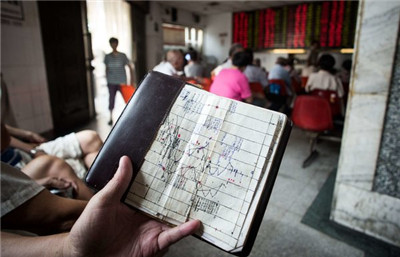(单词翻译:单击)
HONG KONG — China on Thursday sought to ease the turbulence its depreciating currency, the renminbi, has set off in global markets, even as it pushed the renminbi lower for the third day in a row.
香港——中国试图在周四平息由于人民币贬值而引发的全球市场动荡,尽管当局已经连续三天压低人民币的汇率。
China’s central bank, the People’s Bank of China, set the renminbi’s official exchange rate to the dollar lower by 1.1 percent on Thursday, bringing the total devaluation since Tuesday to 4.4 percent, the biggest drop in decades.
周四,中国的央行中国人民银行把人民币兑美元的官方汇率调低了1.1%,自周二开始的贬值幅度达到了4.4%。这是超过二十年来的最大跌幅。
The renminbi is falling because the government is loosening its tight grip on the currency, but only by a bit.
人民币汇率的下降是因为政府正在放宽对汇率的严格控制,但放宽的程度仍很小。
China’s slowing economy has created pressure on the renminbi to weaken for more than a year, but instead the government held to its longstanding practice and kept it closely linked to the dollar, which has risen as the United States economy rebounded.
中国经济放缓对人民币产生贬值压力已有一年多的时间,但政府仍一直坚持其长期做法,维持让人民币与美元汇率紧密挂钩,而美元则随着美国经济的反弹在升值。
By devaluing the renminbi now, China has delivered a boost to its exporters, whose goods become relatively cheaper for overseas buyers. But the sharp and sudden fall has also raised concerns that the economy is weaker than the official growth rate suggests and prompted questions over the Chinese leadership’s management of the slowdown.
现在,通过让人民币贬值,中国为其出口商提供了助推,因为中国产品对海外买家的价格会变得相对便宜。但是,人民币的突然大幅贬值也让人们担忧,中国经济增长情况比官方数据所暗示的还要差,这让人们质疑中国领导层是否有能力管理经济放缓。
At an unusual ad hoc news conference on Thursday, officials from the central bank were at pains to explain that the currency had not entered a free fall.
在周四临时安排的一个罕见的媒体吹风会上,央行官员尽力解释说,人民币汇率没有进入自由落体状态。

“The central bank has withdrawn from the normal mode of intervention,” Yi Gang, the deputy governor of the bank and the head of the unit that runs China’s foreign exchange system, told reporters in Beijing. “But if you say the market has commonly recognized rules of the game, then those are still the rules that we lay out.”
“央行已经退出了常态式的干预,”中国人民银行副行长、国家外汇管理局局长易纲在北京对记者说。“但是如果说现在市场有一个公认的游戏规则,也是我们央行公布的游戏规则。”
Mr. Yi was referring to changes to China’s currency system that were announced on Tuesday, as the bank devalued the renminbi by nearly 2 percent. It was the biggest daily drop since 1994, when China’s modern currency system began.
易纲指的是本周二宣布的中国汇率制度的变化。当天央行将人民币贬值了近2%,这是自1994年中国启用现代汇率机制以来的最大单日降幅。
Previously, the central bank would assign a value to the currency each morning, and would allow it to trade up or down by a maximum of 2 percent against the dollar. In practice, it barely budged more than a fraction of percentage point each day.
此前,央行每天早上给人民币设置一个价值,允许人民币兑美元汇率在2%的幅度内上下波动。实际操作中,汇率几乎不会大幅浮动,单日波动幅度远远不足1%。
Now, policy makers have said they are giving the market a bigger say by basing the setting of the official exchange rate on the currency’s trading performance, not just on a government decree.
现在,政策制定者说,依据人民币的交易状况,而不仅仅是政府指令来设定官方汇率,能让市场拥有更大的决定权。
Still, central bank officials made clear on Thursday that while they intended to ease their grip somewhat, they would not end it.
尽管如此,央行官员周四也明确表示,虽然他们希望对这种约束稍加放宽,但不会完全放开。
On Wednesday, when the renminbi showed signs of weakening by the maximum 2 percent limit, the central bank was widely reported to have jumped into the currency market, selling dollars to push up the value of the renminbi — which rapidly recovered to close only 1 percent lower.
广泛有报道称,本周三,当人民币有滑落至2%下限的迹象时,央行在外汇市场上采取行动,出售美元以推高人民币——人民币的贬值幅度迅速缩小到了1%。
“They intervened massively and drove the exchange rate up,” said Arthur Kroeber, the managing director of Gavekal Dragonomics, a financial consultancy. Still, he added that the new system “is clearly on the spectrum of a much more market-exchange-rate environment.”
“他们大举入市,干预汇率,”龙洲经讯(GaveKal Dragonomics)董事总经理葛艺豪(Arthur Kroeber)说。不过他也表示,新的汇率制度“明显更适合市场汇率环境”。
On Thursday, trading was more subdued, though heavy trading volume returned again in the final minutes of activity. The renminbi weakened only very slightly, by 0.2 percent. This suggested that, based on the new system, the central bank would not be under pressure to make another drastic shift in the renminbi’s value when it sets the official exchange rate on Friday.
周四,成交量有所抑制,不过在最后几分钟里再次出现了巨额的交易。人民币小幅贬值,下降0.2%。这说明,在新制度的基础上,央行周五设定官方汇率时,不会承受再次大幅调整人民币汇率的压力。
Stock markets across the region recovered modestly on Thursday after the recent sell-off, led by Shanghai, where the main index finished 1.8 percent higher after two days of declines. Other currency markets outside China also stabilized, led by the South Korean won, which rose against the dollar in late Asian trading.
周四,中国股市在经历了近期的下跌后略有回升。回升是由沪市拉动的,其主要股指在经过两天的下跌后上涨1.8%。中国以外的其他外汇市场也恢复稳定,企稳趋势是由韩元推动的,在亚洲汇市尾盘,韩元兑美元汇率有所上升。
Mr. Yi did not directly comment on any intervention when asked about it on Thursday, but hinted it was a tool still at the central bank’s disposal. “When there’s excessive volatility in the market, it can still be effectively managed,” he said.
周四被问及干预举措时,易纲没有进行直接评论,但暗示,它仍是由央行支配的工具。他说,“在市场波动过大的时候,能对它进行有效的管理。”


